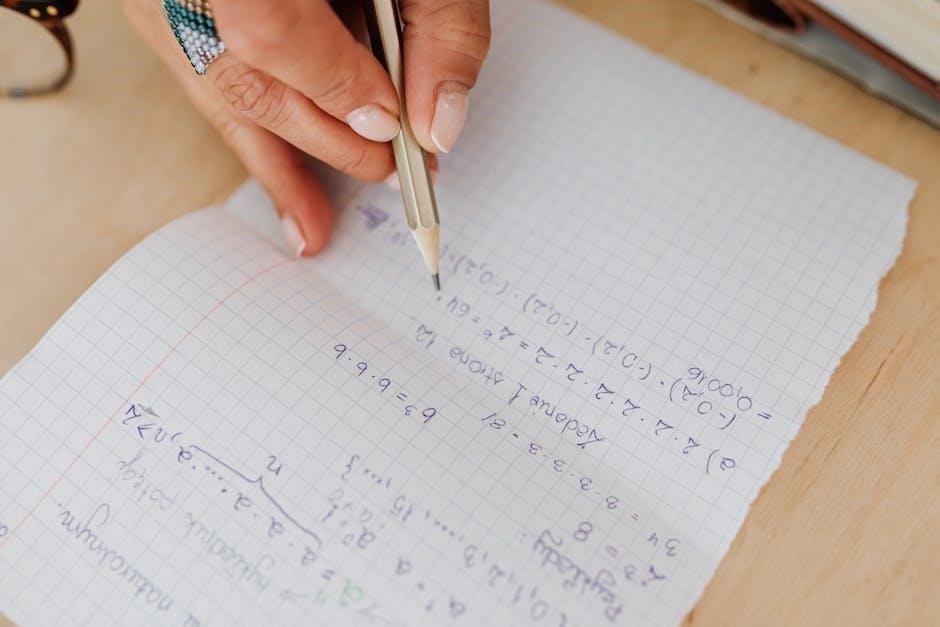The NYS Notary Practice Exam is a crucial tool for individuals preparing to become a Notary Public in New York State. Designed to simulate the actual exam, it helps candidates assess their knowledge of state-specific notary laws, procedures, and ethical practices. By using practice exams, aspiring notaries can identify areas for improvement and build confidence in their understanding of the material. Regular practice ensures familiarity with the exam format and content, increasing the likelihood of success on the official NYS Notary Public examination.
Overview of the NYS Notary Public Exam
The NYS Notary Public Exam is a 40-question, multiple-choice assessment required to become a licensed Notary Public in New York State. Candidates must score at least 70% to pass, demonstrating knowledge of state-specific notary laws, procedures, and ethical practices. Administered in a closed-book format, the exam evaluates understanding of duties such as administering oaths, executing acknowledgments, and adhering to legal standards. Designed to ensure competence, the test covers critical areas like unlawful practice of law, proper documentation, and confidentiality. Preparation is key, as the exam reflects the responsibilities and complexities of serving as a Notary Public in New York.
Importance of Preparation for the Exam
Preparation for the NYS Notary Public Exam is essential to ensure success and competence in performing notarial duties. The exam assesses knowledge of state-specific laws, ethical practices, and procedures, making it critical to thoroughly study and understand these areas. Without proper preparation, candidates risk failing the exam or, worse, facing legal consequences for improper notarization practices. Utilizing practice exams and study materials, such as PDF resources, helps identify knowledge gaps and builds confidence. Thorough preparation not only improves test performance but also ensures that notaries can execute their responsibilities accurately and ethically, upholding the integrity of the notarial process in New York State.

Understanding the Exam Format
The NYS Notary Public Exam consists of 40 multiple-choice questions, requiring a score of 70% to pass. Candidates have one hour to complete the test, ensuring they understand state-specific notary laws and procedures. Practice exams mirror this format, helping individuals familiarize themselves with the structure and content, ultimately improving their readiness for the official examination.
Structure and Question Types
The NYS Notary Public Exam features 40 multiple-choice questions, each designed to test knowledge of notary laws, procedures, and ethical practices. Questions are divided into categories such as administrative duties, legal requirements, and common notarial acts. The exam includes scenario-based questions to assess practical application of knowledge. Practice exams replicate this structure, offering questions that mirror real exam content. Familiarizing oneself with these question types through practice exams helps build confidence and ensures readiness for the actual test. The focus is on clarity and precision, reflecting the importance of accurate knowledge in notary services. Regular practice enhances understanding and retention of key concepts.
Time Limits and Passing Requirements
The NYS Notary Public Exam consists of 40 multiple-choice questions and must be completed within one hour. To pass, candidates need to answer at least 70% of the questions correctly, which translates to 28 out of 40 questions. Practice exams mirror these time limits, helping candidates manage their time effectively. The passing requirement ensures a thorough understanding of notary laws and procedures. By simulating real exam conditions, practice tests build confidence and readiness. Understanding the time constraints and scoring system allows candidates to focus their study efforts and improve their performance. Regular practice helps in achieving the required score efficiently.
Benefits of Using NYS Notary Practice Exams
NYS Notary Practice Exams enhance preparation by identifying knowledge gaps, building familiarity with the exam format, improving time management, and boosting confidence for success.
Identifying Knowledge Gaps
Using NYS Notary Practice Exams is an effective way to pinpoint areas where additional study is needed. By reviewing incorrect answers, candidates can identify specific topics or concepts they struggle with, such as notary laws, ethical practices, or procedural requirements. This targeted approach allows for focused learning, ensuring a stronger foundation in weak areas. Regular practice exams reveal patterns of mistakes, helping candidates address gaps in their understanding before the actual test. This diagnostic tool is essential for refining knowledge and ensuring readiness for the official NYS Notary Public examination.
Building Familiarity with the Exam Format
Engaging with NYS Notary Practice Exams helps candidates become accustomed to the structure and timing of the official test. These practice exams typically feature multiple-choice questions similar to those on the actual exam, allowing individuals to practice under timed conditions. By familiarizing themselves with the format, test-takers can reduce anxiety and improve time management skills. Additionally, practice exams often include questions that mirror the difficulty and content of the real exam, helping candidates build confidence in their ability to navigate the exam environment effectively. This preparation enhances overall performance and ensures a smoother experience on the day of the official exam.
How to Effectively Use Practice Exams
Regular use of NYS Notary Practice Exams helps assess understanding, identify weak areas, and track progress. Consistent practice improves readiness and performance on the actual exam.
Strategies for Taking Practice Tests
To maximize the effectiveness of NYS Notary Practice Exams, adopt a structured approach. Start by setting a timer to simulate the actual exam’s time constraints, ensuring you practice under pressure. Minimize distractions by creating a quiet, exam-like environment. Answer all questions, even if unsure, to avoid leaving blanks. After completing the test, review each answer thoroughly, focusing on incorrect responses to understand mistakes. Use flashcards to reinforce weak areas and ensure comprehension of key concepts. Repeat practice tests regularly to track progress and build confidence. Analyze patterns in errors to refine study focus and improve overall performance systematically.
Reviewing and Learning from Answers
Reviewing answers after completing a practice exam is essential for effective learning. Start by carefully analyzing each question, focusing on why correct answers are right and why incorrect ones are wrong. Use the provided explanations to deepen your understanding of notary laws and procedures. Identify recurring mistakes and create a study plan to address these weak areas. Utilize flashcards or notes to reinforce key concepts and ensure long-term retention. Regularly revisit incorrect answers to track progress and solidify knowledge. This systematic approach ensures that each practice exam becomes a valuable learning opportunity, helping you build a strong foundation for the actual NYS Notary Exam.

Key Areas to Focus On for the Exam
Focus on New York State notary laws, regulations, and ethical practices. Key topics include the unlawful practice of law, proper document handling, and common exam questions.
Notary Laws and Regulations in New York State
Understanding New York State notary laws and regulations is essential for exam success; Key areas include the definition of a notary’s role, ethical practices, and prohibited actions. Notaries must avoid the unlawful practice of law, such as preparing legal documents like wills or contracts. They must also adhere to rules regarding document authentication, oaths, and affirmations. Familiarity with state-specific statutes, such as the Notary Public Law, is critical. Additionally, notaries must understand their responsibilities, like maintaining a journal of notarizations and ensuring proper identification of signers. These laws ensure transparency, accountability, and protection for the public. Practice exams often include questions on these topics to test comprehension.
Common Exam Questions and Topics
Common exam questions focus on key notary responsibilities and legal knowledge. Topics include the role of a notary, ethical practices, and state-specific laws. Questions often cover prohibited actions, such as preparing legal documents or giving legal advice. Other areas include proper identification procedures, handling of oaths and affirmations, and maintaining accurate records. Practice exams frequently assess understanding of notarial duties, like authenticating documents and preventing fraud. Candidates should expect questions on the consequences of misconduct and the importance of impartiality. These topics are vital for ensuring notaries uphold legal standards and protect the public interest. Familiarizing oneself with these areas is crucial for exam success.

Top NYS Notary Practice Exam Questions
Top NYS Notary Practice Exam questions focus on key notary laws, prohibited actions, and proper procedures. Questions cover preparing legal documents, administering oaths, and record-keeping requirements. Sample questions and answers are available in PDF resources, helping candidates understand common exam topics and improve their readiness for the official test.
Sample Questions and Answers
Sample questions and answers for the NYS Notary Practice Exam are designed to reflect the content of the official exam. They cover key topics such as notary laws, ethical practices, and procedural requirements. For example: “What constitutes the unlawful practice of law by a notary?” The correct answer is preparing legal documents like deeds or wills without being an attorney. Another question asks, “What is required for a notary to administer an oath?” The answer involves ensuring the individual understands the statement’s truthfulness. These samples, available in PDF formats, help candidates familiarize themselves with the exam format and improve their understanding of notary responsibilities. Regular review enhances preparation and confidence.

Resources for Downloading NYS Notary Practice Exams
Download NYS Notary Practice Exams in PDF format from trusted sources like Docsity, Quizlet, and official notary preparation websites. These resources offer updated practice tests, flashcards, and study guides to help you prepare effectively for the exam.
Recommended Websites and PDF Sources
For reliable NYS Notary Practice Exams, visit websites like Docsity, Quizlet, and official notary preparation platforms. Docsity offers updated PDFs of NYS Notary Practice Exams, including versions for 2024/2025 with correct answers. Quizlet provides flashcards and study guides to reinforce key concepts. Additionally, educational institutions like Walden University and Chamberlain College of Nursing often share downloadable PDF resources. These sources ensure access to authentic and comprehensive practice materials, helping candidates prepare thoroughly for the exam. Utilize these trusted platforms to download PDFs and enhance your study routine with up-to-date exam questions and detailed answer explanations.
Final Thoughts on Exam Preparation
Consistent practice and thorough review of NYS Notary materials are essential for success. Utilize practice exams to refine knowledge, address weaknesses, and build confidence for the official test.
Creating a Study Plan for Success
A well-organized study plan is key to mastering the NYS Notary Exam. Start by dedicating specific times each day to review notary laws, procedures, and ethical practices. Break down the material into manageable sections, focusing on understanding rather than memorization. Incorporate practice exams to apply knowledge and identify weak areas. Set clear goals for each study session, such as completing a certain number of questions or mastering specific topics. Allow time for review and reflection, using flashcards or summaries to reinforce learning. Regularly track progress and adjust the plan as needed to ensure comprehensive preparation and confidence for the exam.
